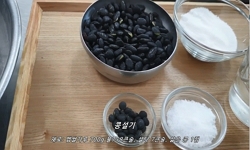Microplastics (MPs), small particle sizes (< 5 mm), are widely distributed in soil environment, recently increasing global attention. Agricultural materials including mulching film, soil conditioners, and greenhouse materials were major sources of ...
http://chineseinput.net/에서 pinyin(병음)방식으로 중국어를 변환할 수 있습니다.
변환된 중국어를 복사하여 사용하시면 됩니다.
- 中文 을 입력하시려면 zhongwen을 입력하시고 space를누르시면됩니다.
- 北京 을 입력하시려면 beijing을 입력하시고 space를 누르시면 됩니다.
Impact of Microplastics on Rice Productivity, Soil Physicochemical Properties and Greenhouse Gas Emissions in a Rice Paddy during Cultivation: A Pot Experiment
한글로보기https://www.riss.kr/link?id=A107946375
- 저자
- 발행기관
- 학술지명
- 권호사항
-
발행연도
2021
-
작성언어
English
- 주제어
-
KDC
523
-
자료형태
학술저널
- 발행기관 URL
-
수록면
273-273(1쪽)
- 제공처
-
0
상세조회 -
0
다운로드
부가정보
다국어 초록 (Multilingual Abstract)
Microplastics (MPs), small particle sizes (< 5 mm), are widely distributed in soil environment, recently increasing global attention. Agricultural materials including mulching film, soil conditioners, and greenhouse materials were major sources of MPs to be incorporated into agroecosysyems. MPs can influence soil physical, chemical, and biological properties, which may affect biogeochemical cycling in agricultural soils, potentially influencing greenhouse gas emissions (GHGs) and deteriorating crop productivity. However, few studies were carried out to investigate the effects of MPs on greenhouse gas emissions and productivity as well as soil quality during rice cultivation. In the pot experiment, different levels of MPs (0, 0.025%, 0.05%, 0.1% wt wt<SUP>-1</SUP> which roughly corresponded to 0.5~2 Mg ha<SUP>-1</SUP> in the field) that are mixed with the proportion of mulching film (60% wt wt<SUP>-1</SUP>), pesticide bottle (35% wt wt<SUP>-1</SUP>) as high-density polyethylene (HDPE), and other plastics (5% wt wt<SUP>-1</SUP>) including PP, PVC, PET were incorporated at the presence or absence (no cultivation, only added MPs) of rice plant with triplicate before the rice transplanting. We monitored GHG emissions (CO₂, CH₄, and N₂O), rice growth characteristics and yield, soil physical (qualitative and quantitative analyses of leachate) and chemical properties (pH, total C, N, extractables etc.) during cultivation. Our results showed MPs incorporation increased over all GHGs emissions during cultivation, showing much higher emissions in the absence of rice plant. MPs additions also suppressed rice growth and mainly reduced tiller numbers and height with increasing MPs application levels. Soil physical properties were also deteriorated by MPs additions, showing an obvious decrease in leachates at the higher levels of them. Our results indicate MPs incorporations can deteriorate overall soil quality including physical and chemical properties, which lead to significant decrease in rice productivity. Moreover, MPs can potentially increase GHGs emissions, probably due to the increased decomposition rate of MPs incorporated in rice paddy. Conclusively, our findings suggest that MPs might have a potentially hazardous impacts in rice paddy ecosystem. Therefore, the mitigation strategies of MPs should be urgently developed for a better and sustainable agricultural environment.
동일학술지(권/호) 다른 논문
-
- 한국토양비료학회
- 김필주(Pil Joo Kim)
- 2021
-
빅데이터를 통한 전라도 지역 벼 깨씨무늬병 발생지와 비발생지의 논 토양화학성 비교
- 한국토양비료학회
- 서한률(Han-Ryul Seo)
- 2021
-
광 및 온도가 새싹보리의 사포나린 함량 변화에 미치는 영향
- 한국토양비료학회
- 윤영은(Young-Eun Yoon)
- 2021
-
나노플라스틱 크기가 청치마상추의 생장과 흡수에 미치는 영향
- 한국토양비료학회
- 김보현(Bo-Hyun Kim)
- 2021




 DBpia
DBpia






